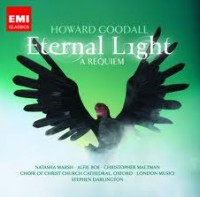Programme Notes
The writing of a Requiem is a special challenge for any composer. The catalogue of mighty predecessors is one thing. Vittoria, Mozart, Verdi, Brahms, Berlioz, Fauré, Dvořák, Duruflé, not to mention the Britten, Ligeti and Lloyd Webber settings in more recent times. I had the additional challenge of conceiving a choral piece that would be danced by the dazzlingly exciting Rambert Dance Company, choreographed by their Artistic Director, Mark Baldwin.
The Catholic liturgical template from which all those famous Requiems stem, the Missa Pro Defunctis, takes as its basic premise the notion that the living intercede on behalf of the souls of the departed in the hope they are granted everlasting life. In this tradition, all humans are deemed sinners by virtue simply of being human, never mind what else they might have got up to, and are urgently in need of our prayers and supplications. There is an emphasis in settings from the Middle Ages to the Enlightenment on judgement, hellfire and damnation, an emphasis that Berlioz and Verdi hammered home with their famously cataclysmic Dies Irae movements.
I took what you might call a Brahmsian route. Brahms broke with tradition by selecting German-language texts not found in the ancient Latin funeral rite and by his intention that the Requiem could provide solace to the grieving who live on, rather than dire warnings of damnation, or pleas for the departed as they linger in purgatory.
For me, a modern Requiem is one that acknowledges the terrible, unbearable loss and emptiness that accompanies the death of loved ones, a loss that is not easily ameliorated with platitudes about the joy awaiting us in the afterlife. A number of recent events in our collective experience and one or two on a private level have reinforced for me the catastrophic grief that follows the loss, particularly, of young people. The death of someone before their time fights nature and those of us who are left have few if any ways of coming to terms with it. Musical expression can I hope provide some outlet, some reflection, some transportation, even possibly some comfort. I discussed this at length with Mark Baldwin and the ways in which its resonances might be interpreted, illuminated and further explored in dance. This was to be a Requiem for the living, a Requiem focussing on interrupted lives.
Eternal Life: A Requiem was first produced in 2008, the 90th anniversary of the end of World War One, possibly the last such commemoration with any surviving combatants, and though it was not deliberately conceived thus, it is powerfully appropriate that the central Dies Irae movement takes as its vision of hell the horror of armed conflict. Alongside the Latin text phrases I have juxtaposed John McCrae’s haunting war poem In Flanders fields. McCrae, a Canadian military doctor of great distinction, died on the Western Front in January 1918. His poem is read each year at Canadian Remembrance services. In our creative discussions we agreed that the hideous losses of the Great War still feel relevant, given that the soldiers of that conflict were little more than the age of today’s school children. Poppies, the universally poignant symbol of that war, are newly significant now, as Allied troops fight a current campaign amidst opium poppy fields in Afghanistan.
The technique of placing English poetry with fragments of the Latin, often sung simultaneously or antiphonally between soloist and choir, characterises the whole work. One section of Latin text comes not from the Requiem mass but from the Book of Revelation, with its description of the coming of the Angels of the Apocalypse. The Recordare movement combines with Phineas Fletcher’s early-17th century sacred poem Drop, drop, slow tears. Other texts are drawn from Francis Quarles, Mary Elizabeth Frye and Ann Thorp.
In all these verses there is a common theme of compassion for the bereaved. The sacred texts offer everlasting light as an image of resurrection and survival for the departed. I do not seek to contradict the Judaic-Christian faith in life after death, merely to examine it through the prism of our modern experience.
Howard Goodall
